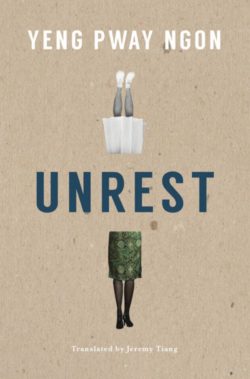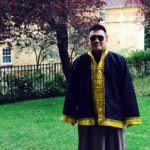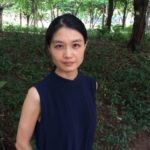Unrest by Yeng Pway Ngon
Translated by Jeremy Tiang
Balestier Press, 2017
Publisher's Blurb

When the fervour of revolution is gone, what remains?
Four leftist teenagers in 1950s Malaya dedicate themselves to overthrowing colonialism and bringing about a better world. With time, their paths diverge — into capitalism, into adultery, into the dark heart of the Cultural Revolution. Disillusioned and middle-aged, they look back at their lives from the prosperous but soulless 1980s, wondering what has become of their dreams and ideals.
Winner of the Singapore Literature Prize
Reading Chinese Network Reviews
Reviewed by Wang Bing, 14/11/18
 In 2004, Unrest won the Singapore Literature Prize. More than a decade later, thanks to a translation by Jeremy Tiang, I have the chance to read a novel written by Southeast Asian writer Yeng Pway Ngon.
In 2004, Unrest won the Singapore Literature Prize. More than a decade later, thanks to a translation by Jeremy Tiang, I have the chance to read a novel written by Southeast Asian writer Yeng Pway Ngon.
Looking at the cover, I wonder what kind of a story it is. On a brown cover, are portrayed two women’s legs, dressed distinctively in opposite fashion. They mirror each other vertically on the title UNREST. The one on the top is a student-like figure, wearing a pair of white canvas shoes and a white knee-length skirt. By contrast the figure underneath the title seems more mature, dressed in a silky traditional Chinese qipao, with a pair of black high heels and black leggings. However, turning over, at the back of the book it says ‘When the fervour of revolution is gone, what remains?’ I am wondering how the two match each other.
The answer lies in the story. It is not a novel full of political conspiracies, such as feuds of the masses and the government. Instead, Yeng crafts a narrative of four ordinary overseas Chinese immigrants. In fact, all the characters mentioned are ethnic Chinese. Weikang ended up in Guangzhou after his release from the prison. Ziqin and Daming left Singapore for China at first but later lives in Hong Kong. Guoliang stayed in Singapore going next to Hong Kong and Guangzhou to meet Ziqin and Weikang respectively. Before leaving Singapore, they were all actively involved in protests inspired by the dialectic materialism. To them, China was the ‘fatherland’, shouldering strong responsibility to take care of his lost sons and daughters. Cultural Revolution has been mentioned but it was only one of the moments of unrest in the story. The Tiananmen Square incident has a minor presence to help the story to complete its journey till the end of the ‘soulless 1980s’. However, to the fatherland, 1980s signifies that China has entered an era of modernisation.
I like the story because of the nuances of the Chineseness embodied within it. ‘Chinese’ is a slippery term and very easy to misuse. The lives of overseas Chinese are rarely known to the mainlanders. Chinese people who reside in Southeast Asian countries tend to be culturally diverse. In the novel, the reader encounters Hokkien, Hakka, and Teochiu people. Ah Huat, though not sounding like Chinese, is most likely one of the dialects from above. This is also the reason why in Singaporean dramas the audience can often hear lots of dialects. Jeremy Tiang has kept this in his translation of the work and I thank him for doing this to maintain the story as a Singapore one instead of a generic Chinese novel.
However, this work is also of global significance as the moments of unrest described are still applicable in our contemporary context. While reading it, I could not help but reflect on the society in which we are currently living. Daming’s conversion from a socialist devotee to a goalkeeper of the capitalist lifestyle does not sound alien to many I gather. Weikang and Guoliang’s homosexual encounters, though a taboo in Singapore, are apparently catching up with the contemporary way of thinking. They do not end up being couples. Instead, they both crave to have female bodies when they enter adulthood. Thus, this primitive feelings towards homosexuality may be worth a deeper exploration even for us.
Finally, the work has been greatly benefited from Jeremy Tiang’s translation. He is a fine writer himself, also a Chinese Singaporean. This could be the reason why he is capable of transforming the subtleness of the Chinese language into the crisp English effortlessly.
Reviewed by Wang Bing
Reviewed by Andreea Chrita, 13/8/18
 Unrest is a novel born out of author’s Yeng Pway Ngon fabricated sense of nostalgia for his remote Singaporean childhood, marred by intense anti-colonialist sentiment against the British rule, at the end of the 50’s. The main characters, Guoliang, Weikang, Ziqin and Daming share a similar turbulent early-age and adolescence under the Queen’s will; They witness horrors inflicted upon any alleged sympathizers of the communists, along with cultural crimes meant to destabilize their shaken off identity as Singaporean or Malay Chinese. As later in life Weikang, Ziqin and Daming leave their homeland for China and Hong Kong, their leftist revolutionary ideals expand, explode and then deflate. The strong sense of identity slowly seems to evaporate, in a wretched twist of historical amnesia. Weikang’ s Marxist vitality disarticulates under the absurdity of the Cultural Revolution. Daming superficially engages with various protests in Hong Kong, without firmly sticking to any ideal and playing unconvincingly the hero card.
Unrest is a novel born out of author’s Yeng Pway Ngon fabricated sense of nostalgia for his remote Singaporean childhood, marred by intense anti-colonialist sentiment against the British rule, at the end of the 50’s. The main characters, Guoliang, Weikang, Ziqin and Daming share a similar turbulent early-age and adolescence under the Queen’s will; They witness horrors inflicted upon any alleged sympathizers of the communists, along with cultural crimes meant to destabilize their shaken off identity as Singaporean or Malay Chinese. As later in life Weikang, Ziqin and Daming leave their homeland for China and Hong Kong, their leftist revolutionary ideals expand, explode and then deflate. The strong sense of identity slowly seems to evaporate, in a wretched twist of historical amnesia. Weikang’ s Marxist vitality disarticulates under the absurdity of the Cultural Revolution. Daming superficially engages with various protests in Hong Kong, without firmly sticking to any ideal and playing unconvincingly the hero card.
Surprisingly, Guoliang and Weikang’s recollections of past colonial crimes, a constant in their restless childhood, make up for the novel’s most lyrical narrative parts. Grotesque images of death and mournful voices mix with memories of Tamil, English or Chinese accents coloring their exceptionally turbulent infancy. Yeng Pway Ngon infuses his characters’ psychological complexity with touches of cultural hybridity stemming from the amazing mix of cultures that contextualized their early life. It’s only as they age and dislocate from their native places, that an acute sense of tern individuality takes over.
Characters’ private lives replace their social and political concerns as they mature into adulthood. When the story lines move into the 80’s, readers may witness how the male characters’ passionate youth ideals are progressively substituted with personal and emotional issues. As the narrator moves in and out their sexual, revolutionary, pseudo-revolutionary and nostalgic-childhood ramblings, it is impossible not to notice that their social engagement with history becomes rather a pretext to recount their most intimate private matters.
Sexuality figures strongly in the novel. Readership may feel almost forced to attest to Ziqin and Damin marriage degradation throughout numerous chapters of the novel, as well as to Ziqin’s failed euphoria of a one night with Guoliang. Their old but uneven connection rekindles rather artificially after 30 years, due to a fortunate encounter between the two old friends, Weikang and Guoliang in Guangzhou. The moments of passion between Ziqin and Guoliang, vividly and self-aware voyeuristically described by the author, are imbued with poetic language. Yet, these same passages, scattered generously throughout the narrative, disclose a very acute and conscious sense of artificiality on behalf of the narrator. It is mostly when articulating the flow of intimacies between Ziqin and Guoliang that Yeng Pwai Ngon feels the need to mention straightforwardly the utter fictional nature of his novel. And he does so by intros of literary theory borrowed from Roland Barthes, by stating in scholarly fashion his creative torments in designing the characters or by calling them ‘the female protagonist’ or ‘the male protagonist’. Beyond the obvious naughty experimentalism with language and structure lies an important ideological statement of Yeng’s novel. Its on-your-face artificiality mirrors the same sense of fakeness in characters’ lives, their complicity with unhappiness. They are aimless souls weakened by the psychological uniformity inflicted upon them by their estrangement from their roots; they are pawns entangled with the mercantile pursuits of the modern global world, which failed to heal the loss and trauma of their childhood.
Unrest is written in Chinese, a conscious effort on behalf of the author to keep up alive the beauty of his native language, formerly brutalized by colonial forces in 50’s Singapore. Yeng’s narrative is consequently replete with details of his own childhood; the absence of the father figure or passionate devotion to books feature prominently in the narrative as well as in Yeng’s own life.
Rather than standing out as a novel on sex and power and the intricate relation between the two, I’d rather suggest that Unrest is more about the loss of childhood and along with with it, the loss of identity, which brings into play the characters' sense of fictitious nostalgia and their desperate need to find a purpose in a globalized yet uniform world.
Reviewed by Andreea Chirita
Reviewed by Kate Costello, 18/7/18
 Written by Singaporean author Yeng Pway Ngon and winner of the Singapore Literature Prize in 2004, Unrest occupies an important position in new translated literature from Chinese. Yeng Pway Ngon offers us a side of Chinese language literature rarely seen in a literary market dominated by Mainland fiction. Modernist in form, the fractured narrative follows the lives of four characters from their teenage years in Malaya to the discontents of middle age. It offers an atmospheric portrayal of Hong Kong in the 1980s and is a tribute to the tumultuous and shifting nature of memory.
Written by Singaporean author Yeng Pway Ngon and winner of the Singapore Literature Prize in 2004, Unrest occupies an important position in new translated literature from Chinese. Yeng Pway Ngon offers us a side of Chinese language literature rarely seen in a literary market dominated by Mainland fiction. Modernist in form, the fractured narrative follows the lives of four characters from their teenage years in Malaya to the discontents of middle age. It offers an atmospheric portrayal of Hong Kong in the 1980s and is a tribute to the tumultuous and shifting nature of memory.
The novel’s structure may require a bit of settling into, but once you abandon yourself to the winding narrative, the lush language carries the novel forward. The inviting prose paints a vivid portrayal of characters at both the height of their political fervor and the nadir of their discontent. There is a palpable feeling of voyeurism reading the novel, though more often than not we are left with a gnawing feeling of dissatisfaction accompanied by the deep sense of disquiet that permeates the novel. This narrative tension speaks to the immersive nature of the book, to the effect that the deep sense of anxiety and discontent felt by many of the characters is often experienced by the readers as well.
Unrest is a book that asks a lot of its readers. Yeng Pway Ngon invites readers to experience a tumultuous history often overlooked by an international audience. His layered narrative weaves together the stories of characters from different political and social backgrounds with dexterity and finesse, deftly shifting narrative angles to keep the reader engaged and on their toes, waiting to see what happens next. Those familiar with mainland Chinese literature in translation may be surprised by the lightness with which Yeng Pway Ngon treats political events, including the Cultural Revolution, but this in no way detracts from their tragedy. Political happenings are deeply interwoven and indeed inseparable from the individual’s life, and yet they cannot fully explain the melancholy and alienation felt by many of the characters. Instead, the novel is a testimony to the fervor and anxiety of youth, and the mid-life crisis, in both its claustrophobia and its dullness. The tense political backdrop brings these feelings to a boiling point as Yeng Pway Ngon invites us to relive this fraught period of history.
Yeng Pway Ngon’s narrative style recalls the work of Gao Xingjian, both in its formal innovation and political undercurrents. Unrest should be read by anyone who enjoyed One Man’s Bible, as it indulges in similar maneuvers with regard to the relationship between the characters, the author, and the reader. Characters weave their way through the novel as if of their own volition, and one female protagonist takes the opportunity to chastise the author for trying to dictate and control her story. The heady metafictional technique skirts the line between playful and overdrawn, and the staged conversation between the author and his invented female character may have lost some of its potency in the face of debates raging in the social sphere today. It’s hard to fault the novel for this however, as it was originally published nearly two decades ago, and we would be hard pressed to hold many Western classics (such as the work of Kundera, who is lovingly invoked throughout this work) to this same standard.
Jeremy Tiang’s effortless translation recedes into the background, allowing the sparse prose and narrative detachment to shine. Tiang is an accomplished writer in his own right, with his debut novel State of Emergency winning accolades for its adroit storytelling and its evocative narrative language. He brings this precision to Unrest, inhabiting Yeng Pway Ngon’s world as he renders it in a coherent and distinctive narrative voice in English. Two more of Yeng Pway Ngon’s novels are forthcoming with Balestier in the fall (Opera Costume, also translated by Jeremy Tiang and Lonely Face, translated by Natascha Bruce), making the work of one of Singapore’s most important Chinese language writers available in English translation. Balestier Press should be commended for continuing to bring us exciting new translations that might be too risky for larger commercial publishers, as well as raising the profile of Singaporean literature written in Chinese on the international market.
Reviewed by Kate Costello
Reviewed by Stephanie Boote, 29/6/18
 Yeng Pway Ngon’s Unrest is a story which is preoccupied with nostalgia and the consequences of youthful decisions. As the tagline of the book suggests “When the fervour of revolution is gone, what remains?”. Readers of this book should be prepared for an experimental narrative style and an unusually proactive female protagonist.
Yeng Pway Ngon’s Unrest is a story which is preoccupied with nostalgia and the consequences of youthful decisions. As the tagline of the book suggests “When the fervour of revolution is gone, what remains?”. Readers of this book should be prepared for an experimental narrative style and an unusually proactive female protagonist.
Unrest’s backdrop is that of revolution in 1950’s Malaysia and the ensuing anti-climax explored through the perspective of four students who were involved. Following translator Jeremy Tiang’s debut novel State of Emergency this subject is familiar ground. An element of this book that I found particularly funny was the inevitable hypocrisy which is expressed and addressed by these characters. For example, when Daming sits in a restaurant in Vancouver discussing the events of Tiananmen Square with his son and is scathingly asked “So it’s struggle and demonstration when you do it, but what’s happening in Beijing is a disturbance?” Of course throughout the book Daming’s hypocritical nature has been addressed several times by the author, leaving this encounter as the nail in the coffin that was Daming’s reputation with the reader.
Hugely important to this book is the nature with which these character’s lives intertwine and diverge from each other. Whilst an interesting and enjoyable narrative device this style would be a lot easier to follow if the characters were consistently referred to by their names rather than by “the female protagonist” or “a man”. However, this ties in to the experimental narration Yeng Pway Ngon uses to express a sense of his personal relationship with these characters. Even being able to have conversations with them, withdraw from intimate moments with them and allow them to control the story at will. In doing this Ngon is able to become a fifth main protagonist experiencing the story alongside them. Ultimately inserting himself into the story in this way emphasises the way in which his protagonists lives intertwine, using himself as a common enigmatic thread which binds their lives together. This narrative device opens up potential for creative and assertive characterisation, however I also found that it opened up opportunities for disappointment.
My favourite element of the book was the relationship between Ziqin, the book’s main female protagonist, and Ngon himself. Following Ziqin’s hijack of the entire plot and refusal to continue with the plan the author has for her, is a delightful segment which deconstructs the roles often prescribed to women in fiction and her disgust at the thought of living through that. This style is so effective not only in relation to Ziqin’s character arc but also in emphasising the idea of Ngon being an unreliable narrator. From one perspective Ziqin grows from a naive young woman into someone with the confidence to disrupt her entire life plan and forge a unique future. On the other hand, Ziqin is simply a woman fed up with the misrepresentation of her story and determined to set the record straight. This segment serves to have the reader second guess their assumptions of her character and draw attention to the problematic portrayals of her struggle. Earlier in the book the author describes her seduction by Daming as highly romantic and her becoming overwhelmed as a result of her devastating emotions, during her meta segment Ziqin easily corrects the author and clarifies the sexual harassment which took place. The humour of this chapter can be identified within the first few lines “Did you see what the novelist wrote about me? Typical man.”
Unfortunately, as much as I enjoyed this meta narrative style, I found that it only caused other aspects of the novel to be anti-climactic. It was a shame to me that Ngon was willing to so humorously deconstruct the role of women in fiction without doing the same for the homosexual relationship between Weikang and Gouliang. The fact that Ziqin and the author were able to have such a personal relationship but the other characters were not, seems a shame to me. Perhaps due to the climate the book was published in, exploring LGBTQ+ themes were not a viable option, however, this does beg the question why introduce this relationship in conjunction with this narrative device at all? The meta-nature of this technique is hugely effective and I would’ve loved to have seen it used for more than one character – particularly for characters who have such complicated issues to work through. Ultimately I respect Ngon for the inclusion of this relationship, I would’ve just liked to have seen more deconstruction and subsequent development.
Ultimately I enjoyed this book and I would recommend it to anyone seeking to learn more about Malaysia’s history as well as anyone seeking to have a wider view of women in East Asian fiction.
Reviewed by Stephanie Boote
Reviewed by Henry Yunwei Wang, 27/5/18
 Whilst writing this book review of Yeng Pway Ngon's brilliant work Unrest, I just turned 25, painfully soldiering on at the end of a relationship. The complex emotional portraits behind the strand of political running through the book, sharpen my thoughts again and then deepen the grief to form a real chasm.
Whilst writing this book review of Yeng Pway Ngon's brilliant work Unrest, I just turned 25, painfully soldiering on at the end of a relationship. The complex emotional portraits behind the strand of political running through the book, sharpen my thoughts again and then deepen the grief to form a real chasm.
The narrative starts from a single night of marital infidelity in 1987's Hong Kong. Although both returning to their respective spouses the next day and never seeing each other again, the middle-aged man and woman, Guoliang and Ziqin, are profoundly shaken by the consummation of their ambiguous relationship that began some thirty years in Singapore previously. Explicitly addressed by the authorial voice, we discover that this couple were first met as student revolutionaries in 1950s, with other two protagonists involved, Daming and Weikang, whose bittersweet love story takes place across Singapore, Malaysia, Hong Kong, Taiwan and PRC China. This thirty-year span witnesses fluctuation in their marriage and political ambition: from a solemn pledge of love to sordid adultery, from the high-minded longing of bringing about a socialist paradise to the decline of idealism and ultimate failure of the Communist project. Nothing is forever.
Although with clear political reference, the novel is rather domestic in its tracing of the trajectory of disillusioned ordinary lives by extension different forms of unrest and oppression: of the communists by the British, of the people by the "red guards" in China’s Cultural Revolution, of children by their parents, of wives by their husbands, of gay men by straight society, and of women by men. To capture the curt irony of the original, Jeremy Tiang's similarly brilliant judgement throughout the translation, enables long, complex sentences favoured by Chinese to flow naturally into colloquial English. Setting apart the exotic human history of the leftist student activists between 1950s-1960s, English language readers may find this chance uncommon to lift the veil on the lives from far-off places, unfamiliar, but pretty much universal.
In Yeng’s novel, politics and sexual desire burn for decades and move from side to side in time and among voices. Guoliang and Weikang grew up in southern Malaysia amid the Malayan Communist Party struggling against British brutal rule. As comrades in a radical student group, they met Ziqin and her mentor and lover, Daming, when attending a Chinese-language school in Singapore. Unable to find employment in Singapore, Weikang ended up going to mainland China, where his foreign roots made him a target for persecution and inevitably got him caught up in the Cultural Revolution. Guoliang, the most introverted of the quartet, expelled from university, who had a homosexual encounter with Weikang, who marries and remains behind in Singapore.
Daming and Ziqin set out for PRC China, but got cold feet in Hong Kong, waylaid and ultimately seduced by a more capitalist way of life. When life went on, Daming very soon took on the roles of a philanderer, a capitalist, and a devoted hypocrite. Yet the novel then faces the tragedy of history with a defiant melancholy. The fiery radicals became businessmen, housewives, and pensioners—those ordinary people once shook the part of the world, but never could do so again.
One can be fully mesmerised by and appreciative of Yeng's manipulation of narrative voices. Especially when the characters' situation unfolded and their lives began to dovetail into each other: taken as a collective, it could be very difficult to put all these threads clear together. Rather than being merely self-indulgent, Yeng evidently has a constructive intrusion in mind when he created the work. Even though the plots bounce back and forth between the protagonists' points-of-view, and the timeline, Yeng slowly burns a lingering sense of unrest by applying the narrative device of his main female protagonist, Ziqin, conversing with the author himself in a meta-setting. It becomes progressively more interesting when Ziqin, acts a form of rebellion against authorial control, scolds Yeng for his portrayals of female sexuality, self-mortification and attitudes toward empty marriage. At one point, Ziqin even disappeared, leaving Yeng alone in the novel with authorial monologues, which successfully avoids several false turns and dead ends.
Another best component of the work may come in its depiction of single detail and observation, where story settings are evoked in question and complicated mosaic of relationships are brought to the fore. There is particularly well-wrought psychological parsing of Daming and Ziqin's character:
"(Daming) uses his love for Ziqin as a means of controlling her, turning her into a weapon against her mother...He knew this moment represented the utter defeat of Ziqin's mother and Ziqin now safely removed from her domineering power. His body ablaze, he thrust vigorously, his determined gaze piercing into the distance like a general at the head of a victorious column of troops." (pp.99)
"The book is still in her hands, but her heart is no longer in it...How absurd, imagining she has a duty to finish a crappy book. Ridiculous...The urge to find anther book grows and grows...When did it begin? She can't remember...The man's voice on the phone makes her think of a night when they were both teenagers. He strokes her forehead in the dark, then his hands continued over her face and her hair. He looked so shy, so immature." (pp.95-96)
I am constantly reminded of one ancient Chinese saying:
至明至暗日月,至亲至疏夫妻。
The brightest the darkest the sun and the moon, the closest the distantest husband and wife.
Lending some philosophical musing to the travails and flaws of the socialist experiments in South-eastern Asia, Unrest was awarded the 2004 Singapore Literature Prize and highly praised by critics for filling an important gap in articulating Singaporean unique national identity: from Chinese settlement to neoliberal prosperity. It also took a long journey for the English translation to become available in 2012. The latest English edition by Balestier Press and republished version by City Bookroom in 2018 will surely bring this wonderful work and its translation more notice internationally.
Reviewed by Henry Yunwei Wang
Reviewed by Paul Woods, 3/5/18
 Unrest chronicles the late middle-age of a group of idealists who met around the time of the Malaysian emergency and independence, against the backdrop of huge political change in the Chinese world. Indeed, the revolution in China and changes wrought by the communists there created waves which in one way or another buffeted and tossed around the youth who are mature and rather jaundiced middle aged people when we first meet them.
Unrest chronicles the late middle-age of a group of idealists who met around the time of the Malaysian emergency and independence, against the backdrop of huge political change in the Chinese world. Indeed, the revolution in China and changes wrought by the communists there created waves which in one way or another buffeted and tossed around the youth who are mature and rather jaundiced middle aged people when we first meet them.
Each of the main protagonists is different from the others in many ways, yet all were possessed by a passion to rid Malaya and Singapore of British colonialism and create something new under the inspiration of (the original) socialism with Chinese characteristics.
In many ways the governing motif of this novel is betrayal. The relationship between Daming and his wife Ziqin is tainted by his range of extra-marital affairs and eventually she too is involved with another man. Politically, or ideologically, both Daming and Ziqin betray their principles and their friends by not following their proclaimed revolutionary path to China and settling in Hong Kong, where Daming becomes a powerful businessman. As an older man Guoliang has a liaison with Ziqin and thus betrays his own wife in Singapore. His good friend Weikang was the only member of the group that followed his socialist principles all the way and went to live and work in China. In this case the betrayal is not by him but of him. His utopian dream of socialist China does not appear and the Communist Party betrays its own principles during and after the Cultural Revolution. The communists betrayed not only their own nation, but also the trust and commitment of Overseas Chinese who came back to serve the motherland.
The theme of betrayal and the complex relationships between protagonists and supporting characters give the reader a somewhat wistful feel. As I got to know the characters and began to like some of them I thought of what might have been and wished that things had turned out differently for them. The novel communicates a feeling of wasted youth and idealism, the energy and passion of youth dissipated by a changing world and the harsh realities of politics and ideological movements in the hands of cynical players, be they the British colonists, the Singapore government, or the Chinese Communist Party.
The story is intriguingly constructed, with frequent movements in time and space, and the reader has to check the setting of each chapter in order to arrange the sequence and relationships correctly in his or her mind. This device is a little disorientating at first, but serves to focus the reader’s interaction with the narrative around the characters and their unfolding relationships.
The author exercises his sovereignty over the story and its characters by intervening and commenting into the story, violating the text worlds formed between reader and narrative on one hand and characters within the narrative on the other. Rather than let them be and interact only with each other, Yeng chooses to get involved in a way that reminds me of the Truman Show. In the second half of the novel Yeng engages in direct communication with Ziqin, his authorial omnipotence and omniscience strangely limited. Does this breaking in of author into novel work well? I am not sure. It is hard to discern why this strategy is only used between the author and Ziqin. I wonder why Yeng did not behave in the same way towards the other characters, particularly Daming, who is probably the least likeable of the characters. Perhaps he is beyond redemption.
It was interesting to read this novel very soon after Jeremy Tiang’s State of Emergency, as they cover some similar material and touch on related themes. Tiang’s work is neater and better behaved than Yeng’s, and the reader achieves a reasonable sense of closure as that novel comes to an end. Unrest feels more postmodern in almost every way and it was satisfying to see a novel dealing with history constructed by and subjected to postmodern principles. I probably still prefer State of Emergency, but it was fun to read the two books so close together.
The English translation was well done, but the book did contain minor typos and punctuation issues which let it down a little.
Finally, Unrest seemed an odd title at first, as the passion of youth and the tension of newly independent Malaysia had clearly been attenuated by the pragmatism and cynicism of middle age. Yet by its complex narrative structure, wasted potential in the lives of the characters, and intervention by the author, the book creates considerable unrest in the mind and heart of the reader.
Reviewed by Paul Woods
Reviewed by Cuilin Sang, 30/4/18
 Commenting on Kundera’s The Unbearable Lightness of Being, John Banville writes:
Commenting on Kundera’s The Unbearable Lightness of Being, John Banville writes:
A novel, even a novel by so engagé a writer as Kundera, must be judged in terms of art, and not of its moral, social or political weight. There is too much spilt politics in The Unbearable Lightness for its own good. What is remarkable, however, is that a work so firmly rooted in its time has not dated. (May 2004, The Guardian)
The same could be said about Yeng Pway Ngon’s Unrest, which resonates with Kundera’s Unbearable Lightness in so many ways that it sometimes might read like a sequel to Unbearable. The “political weight” in Unrest is obvious, as well as its “social weight.” The “unrest” is not only instigated by the post-war Malayan struggle against colonialism, the leftist students in Singapore protesting against the government, the cultural revolution in China, but also by the non-localized identities of the protagonists who seem to constantly seek for a sense of belonging. Is there “too much spoilt politics for its own good”? Perhaps. But like Unbearable, Unrest is first and foremost a work of art.
Like Unbearable, Unrest has four main characters, whose entangled relationships and narrative voices enrich and varify the texture of the text. Among the various relationships between them, Weikang and Guoliang’s is perhaps the most confusing and suppressed one. As the “Alpha” in this unfulfilled relationship, Weikang nonetheless constantly attempts to justify his desire for Guoliang. Raised in a culture where homosexuality is taboo, no one, even the author, seems to be sure as to how to deal with the “wrong” or strange thoughts. Homosexual desire is explained away, or confused with unfulfilled heterosexual one: “These boys didn’t dare touch actual girls, so Four-Eyes became the receptacle for their murky fantasies and nebulous desires” (p.12). Thwarted by his unachievable and unexplainable urge, Weikang etches the place he was growing up with Guoliang into his mind and can draw every detail from memory with visual and emotional vividness.
Yeng’s male characters are usually hesitant, conflicted, and generally not faring well in life. In them there is the odd combination of Prufrockian modernist timidity and the vestiges of patriarchal confidence boosted by centuries of Chinese feudal civilization. Yeng seems to sympathize with the middle-aged male characters who either have lost their jobs, or struggle to keep a failing small business afloat, and thus have lost the respect from their wives and children. In his short story “The White Bird白鸟” the unemployed husband can only bond with a white bird he has rescued, and in a magic-surrealist ending, eventually turns into another white bird. Weikang’s father, although a minor presence in the book, is stuck in the similar predicament a lower-class man would face in a harsh capitalist economy coupled with stereotypical expectations for men in a culture still influenced by feudalism and Confucianism.
The frequent interjections of “I” observing the female protagonist reminds one of Tereza observed and commented on by Kundera, whose presence in the text is palpable not only through Yeng’s homage to his narrative technique, but also through the familiar theme of the test of human morality. Kundera is actually referenced in Chapter 9 and then again in a section titled “Sex and Politics”; and the subject of “kitsch,” which Kundera keeps returning to in his work, is discussed at a rather too literal level.
One of the most prominent features of Unrest is the polyphony performed by its narrative voices. The text is edited with a montage-like technique that creates a sophisticated compositeness resulting from the coordination from the individual textual fragments with their own distinct narrative “values”. The “sutures” between textual segments are at times exposed through the deliberate intervention from the author posed as the “I,” who would direct the reader’s attention to certain places by making direct requests. At other times, the connectedness of the narrative is subtler, such as the knocking sound traversing two time periods in Chapter 3, where the identity of the “male protagonist” is still not revealed, but already has been heavily hinted at.
On many levels, this narrative polyphony unravels the stability of the text as a whole. The authorial “I” is occasionally joined by other more obviously fictitious “I”s narrating in differently gendered voices from their own perspectives on the same event. And the deliberate anonymity of the protagonists examined by the authorial “I” in the beginning chapters and its being gradually revealed by other narrative threads only add to the overall unrestness of the text. The Russian doll narrative unfolds not only the twists and turns of a storyline, but also the unpredictable fickleness of human heart.
The “as I type”(p.145) , procedural writing comes to a crescendo in Chapter 8 titled “Control and being Controlled,” where the authorial “I” has an actual conversation with his protagonist, Ziqin; and in Chapter 10 titled “The Anxiety of Influence,” where Ziqin speaking in the first person critiquing male authors’ dismissive treatment of their female characters. Different from Kundera, who in Unbearable makes it clear that his characters are fictitious and by extrapolation don’t have their own free will, Yeng lends Ziqin something approximate to free will and makes it look like it is out of his hands regarding this female protagonist’s critical life choices, such as whether or not to emigrate to Canada with her husband. This facetious devolution for narrative control adds yet another layer of “Cadenza” unrestness to the overall texture, undercutting the weight and seriousness of the looming darkness in the ironically harsh reality.
Despite the “experimental” narrative strategy, at the thematic level the novel can be traditional and conventional. The reflection upon life and death by Weikang, for example, is very much in tune with the prevalent sentiment in Chinese classical poetry. The inconsolable sadness brought by the realization that nothing remains, or only ash remains, after bodily death, is accepted as fate by him with an almost resolute peace, which, probably intended, is quite the contrary to the general theme of unrest.
Reviewed by Cuilin Sang
Reviewed by Markéta Glanzová, 30/4/18
 Unrest is a novel written by Singaporean poet, novelist, playwright and critic Yeng Pway Ngon, who already has twenty-six books (written in Chinese language) to his name. Unrest was originally published in 2002 and was awarded the Singapore Literature Prize in 2004. This year (2018) it was translated into English by Jeremy Tiang, who made reading the novel a very enjoyable experience.
Unrest is a novel written by Singaporean poet, novelist, playwright and critic Yeng Pway Ngon, who already has twenty-six books (written in Chinese language) to his name. Unrest was originally published in 2002 and was awarded the Singapore Literature Prize in 2004. This year (2018) it was translated into English by Jeremy Tiang, who made reading the novel a very enjoyable experience.
The novel tells a story of four protagonists: Daming, Ziqin, Guoliang and Weikang, who (as students) were all politically active in British colonial Malaya in the 1950´s and 1960´s. The novel is set in the 1980´s and shows how the paths of the four protagonists separated with everyone living completely different lives in various places (Singapore, Hong Kong and China). The story doesn´t focus just on one character but the perspective skips from one to another, so all four protagonists have space to speak. Not only perspective but also time skips from the present (1987) to the past and piece by piece the reader can put together the story of each character. Even though all the protagonists have the chance to speak, the more you are reading the more obvious it becomes that one of the characters is having more space than the others. It is Ziqin, the only female character of the novel, who married Daming and moved to capitalist Hong Kong with him. Daming is a born leader and the person who always knows what is best for him and has no problem with changing his opinions accordingly. This is why after arriving in Hong Kong he abandons his leftist activism very quickly and becomes a successful capitalist soon afterwards. Ziqin is very unhappy in their marriage, but for a long time she lacks the strength to oppose it and start her new life.
However, not only does the narrator give Ziqin the most space and sympathizes with her, he also lets her speak to him and express her disappointment with how the story is going. In one moment of the novel, she even disappears from the story and the narrator cannot find her. Later she appears again and is having a deep conversation with the narrator about the role of female characters in a male writer´s novel and about her own destiny as a character in the book which she wants to change. This meta-narration can be disturbing for some readers as it reveals the “fictionality” of the story and labels the characters as merely the author´s construct. However, in this case it seems that the author really cares about his characters, their opinions and feelings. This narrative experiment also proved that the author doesn’t have complete power over the characters (like a god) and that the characters can´t be taken just as an object of his free will and manipulation.
That’s why Ziqin can finally break free from the author and also from her manipulative husband and start to live a life of her own. As the title of the book suggests, unrest is a key motif of the novel. From the political to the emotional arena, the novel explores different meanings which the term “unrest” can convey. Alongside political topics like the revolutionary years in Malaya, life during the Cultural Revolution or life in capitalist Hong Kong, the novel Unrest also offers readers an insight into more personal issues like the mother-daughter relationship, homosexuality or diverse types of love and oppression. For the variety of topics and the unusual narrative construction, this book is definitely worth reading!
Reviewed by Markéta Glanzová
Reviewed by Barry Howard, 29/4/18
 Yeng, a Singaporean author, brings us a multi-layered novel where we meet four people experiencing mid-life crises. We see them in their present 1980s and follow recollections of their teenage years in the 1950s. On the surface they are experiencing an existential discontent, but what is distinctive is the unrest that lies beneath the changes in post-WWII Singapore; its language, culture and political development.
Yeng, a Singaporean author, brings us a multi-layered novel where we meet four people experiencing mid-life crises. We see them in their present 1980s and follow recollections of their teenage years in the 1950s. On the surface they are experiencing an existential discontent, but what is distinctive is the unrest that lies beneath the changes in post-WWII Singapore; its language, culture and political development.
Originally written in 2002, it was perhaps a time for the author to remember a past Singapore that was less Westernised and more firmly attached to China. Voicing such thoughts may in turn have provoked unrest in the readership. Taking language as an example, Singaporeans of Chinese descent often have to use English to communicate. Older generations mainly speak Cantonese, Hokkien, Hainanese, or Shanghainese and read/write in traditional Chinese. The younger generations have been brought up to use Mandarin and simplified script.
As for the story, it starts in a playful manner with author addressing reader directly, suggesting an alternative beginning to the book. Yeng continues this by intermittently breaking away from the story as if providing a commentary or teaching a lesson in creative writing. Although at times the pauses are baffling, overall they are humorous. And they play an important part in breaking a descent into melancholy.
Straightaway we know that adultery will feature. However, it’s the brief mention of British colonialism in Singapore that initially grabbed my attention. It’s a reminder of how little we (British) know about our relatively recent past and interesting how this translation into English can add a further aspect of unrest to a new readership.
The historic theme continues, especially with regard to the Cultural Revolution and those Singaporean Chinese who felt persuaded to return to the motherland. Again, humour lightens the mood as we find out that not everyone naively went ahead with their plans. Overall, though, history plays a supporting role to the main part – middle-age reflection.
Yeng refers to Milan Kundera’s The Unbearable Lightness of Being and I wonder about its influences on Unrest. In particular, characters learn the realities of freedom in a developed society. You can do whatever you want, but so can others; and choices have consequences.
Memories and perspectives are also touched upon. Think of all the shared memories you have with partners/friends past and present. Two people will remember the same event in different ways. Some will recall things about you that you never realized, and you will look back at events involving others that they have no recollection of.
And before long, you find yourself at the end of the book. The characters are about to move in to the 1990s and what happens next is left to our own imagination. What stands out is the reminder that some of our actions will have long-reaching effects. Often, we can only ever understand the outcome much later. And that is where the unrest (or unbearable lightness) comes from. We can never go back, so have to live with our choices. Yeng portrays this with maturity, wisdom and a Singaporean twist.
Reviewed by Barry Howard
Reviewed by Zahra Raja, 29/4/18
 Four teenagers who grow up in 1950s Malaya are brought together in their tireless struggles against British colonial rule. However, this patriotic zeal soon fades and they go their separate ways, split between Singapore, Hong Kong and mainland. The novel explores their different paths, how their idealism fades and how they fall into capitalism, adultery, and even the Cultural Revolution. The title here is just as applicable to the unrest of their lives as it is to political unrest and how they seek to reconcile their identities now they have left the revolution behind.
Four teenagers who grow up in 1950s Malaya are brought together in their tireless struggles against British colonial rule. However, this patriotic zeal soon fades and they go their separate ways, split between Singapore, Hong Kong and mainland. The novel explores their different paths, how their idealism fades and how they fall into capitalism, adultery, and even the Cultural Revolution. The title here is just as applicable to the unrest of their lives as it is to political unrest and how they seek to reconcile their identities now they have left the revolution behind.
Our four protagonists grow up amidst the struggle of the Malayan Communist Party against the British and Yeng provides a good overview of the post-war events; one of the protagonists, Weikang, grows up in Cha’ah New Village which is used as a backdrop for the clashes between the Communist guerrilla factions and British colonialists during the Malayan Emergency (one of the few successful counter-insurgency operations). Later, Weikang joins a radical student group at school, and after government crackdown goes into hiding where he meets Guoliang, who was in the year below him and also in hiding. Guoliang is also tied to our other two protagonists Daming and Ziqin through school; he is in love with Ziqin and resents Daming for commanding her affections. A series of events unfolds that results in their diverging paths; Weikang is arrested and upon release, his identity card is stamped with a blue mark, forever marking him as a target of suspicion. In an act of desperation, he decides to leave Singapore behind for the mainland to find new beginnings. Daming is expelled from school following his active position in the student protests, and Ziqin decides to follow him to the mainland in part due to her uneasy relationship with her family. However, after hearing about the conditions in the mainland, Daming changes his mind and decides to go to Hong Kong; Ziqin describes him as an ‘armchair philosopher’, ‘happy to live in a capitalist society replete with material wealth, whilst expounding on the glories of communism’. As for Guoliang, he remains behind in Singapore and eventually settles down.
It becomes clear very quickly as they settle into their new lives that political unrest has taken a backseat to their emotional and personal unrest. Ziqin suffers through an unfaithful marriage to Daming who is equally obsessed with both money and women. Weikang is put through the horrors of the Cultural Revolution and cannot forget his tryst with Guoliang, who dreams of Ziqin and tries his best to forget that night. Though they now live in more prosperous and less troubled times, they cannot forget the ideals of their youth that drove them, nor can they make peace with the ghosts of their past.
The feeling of unrest throughout the novel is aided by the rather back-and-forth structure of the novel; Yeng makes all four characters narrators as well as indulging in metafictional techniques, inserting himself into the narrative and discussing it with the reader. I’m personally not convinced it adds much to the novel, however I did find the narrator’s tussle with Ziqin interesting to watch. As the novel unfolds, she is increasingly less content to let the author write her story in a way that she feels is not true to herself which has perhaps been the cause of her own internal unrest throughout the novel. The closing scenes of the novel I interpreted to mean that the unrest has not, and perhaps never will be resolved, from the emotional, to the political and the metafictional.
I would say that Unrest requires a bit more concentration than a casual read so as not to miss important snippets that shape the rest of the novel, but it was an interesting foray into a period of history that I previously knew nothing about, and Jeremy Tiang’s eloquent translations made it all the more enjoyable to read.
Reviewed by Zahra Raja
Reviewed by Hsiu-chih Sheu, 20/3/18
 Unrest written by Yeng Pway Ngon, is a story first set in the Chinese Diaspora in Malaysia and Singapore in the 1950s and extends to Hong Kong and China over the span of 30 years. It is through the voices of four main protagonists: Weikang, Guoliang, Ziqin and Daming that the author weaves a poignant story about the difficulty of growing up in a turbulent era while fulfilling one’s political aspiration. Politics and sex are intricately intertwined throughout the story. The protagonists are introduced to the readers in two unexpected reunions in the 1980s when they are at their late 40s.
Unrest written by Yeng Pway Ngon, is a story first set in the Chinese Diaspora in Malaysia and Singapore in the 1950s and extends to Hong Kong and China over the span of 30 years. It is through the voices of four main protagonists: Weikang, Guoliang, Ziqin and Daming that the author weaves a poignant story about the difficulty of growing up in a turbulent era while fulfilling one’s political aspiration. Politics and sex are intricately intertwined throughout the story. The protagonists are introduced to the readers in two unexpected reunions in the 1980s when they are at their late 40s.
The first reunion takes place in Guangzhou when Weikang, meets his long lost leftist friend, Guoliang, from Singapore. The reunion refreshes the memory of their youthful aspirations and the political turmoil in the 1950s in Singapore and Malaysia. Back then, they formed a group of young ethnic Chinese who, incensed by British colonialism, set out to overthrow the foreign domination. Weikang left his family to go pursue his revolutionary dream in China. He was quickly disillusioned and dragged in the calamity cultural revolution. Guoliang remained in Singapore, lost his leftist convictions and turned into a business man. With the business boom of the 1980s, he was on his way to Guangzhou as Weikang did 30 years earlier, only he went to scour for business opportunities.
The second reunion is between Guoliang and Ziqin (the only female). As teenagers, their close relation was cut short when Ziqin falls in love with Daming, the leftist leader. Ziqin and Daming soon get married and planned to move to the fatherland in accordance with their revolutionary creed. However, news of the turmoil in China made them stay in Hong Kong. Daming proved a quick learner of capitalist ways and has made a comfortable life in Hong Kong. He also picked up a womanising habit. His passionate love-making with Ziqin coexisted with marital infidelities. He rationalised his womanizing as: “Don’t get me wrong—his love and lust for his wife haven’t lessened. Definitely not. Can you believe it? After going to bed with another woman, he’ll grow even closer to her. This extra-marital encounter will enrich his imagination so that he is making love with two women at once, one in the fresh and one in his mind. “(p.94). As time goes by, he left his wife and his political views behind. In revenge, or in the name of feminism, Ziqin followed her husband path in adultery. She gradually built a collection of lovers like her husband. The reunion with her Guoliang rekindles the old flame, reconnects her to her past and makes her reflect on the unexpected turn her life has taken.
As they aged, the revolutionary enthusiasm of their youth has given way to the enthusiasm for sex. Sex was a refuge during Cultural Revolution for Weikang: “Weikang felt the full weight of emptiness and boredom. Working in the fields was meaningless physical labour. Only at night, when they bucked under the blankets, did he feel that life had some vitality and meaning.” (p.204) On the other hand, for Daming, in a capitalism society, sex is used as a metaphor to demonstrate power in the capitalism society, The story provides insights into the political climate of the era and on the vagaries of the revolutionary creed that gives way so easily to sexual indulgences, leaving the characters adrift.
The translation reads well and proves credible. Coming from a background similar those of the author’s, the translator is able to convey an authentic voice to the readers.
Reviewed by Hsiu-chih Sheu
Reviewed by Andy Thomas, 24/1/18
 This is a novel about the Chinese diaspora in South-east Asia and Canada. It is about the British as colonial power in Singapore and Hong Kong. It is about identity cards, interrogation, the Special Branch, and expulsion or rejection. It is about finding capitalism with Chinese characteristics. But mostly, it is a novel about sex and power.
This is a novel about the Chinese diaspora in South-east Asia and Canada. It is about the British as colonial power in Singapore and Hong Kong. It is about identity cards, interrogation, the Special Branch, and expulsion or rejection. It is about finding capitalism with Chinese characteristics. But mostly, it is a novel about sex and power.
The British experience of Malaya deteriorated in the 1950s from a harmonious and servile place of rubber plantations to an experience of post-colonial struggle, liberation and further repression. It was a test ground for Kitson’s new military doctrine of Low Intensity Operations and new military technology, including helicopters and defoliants, which the Americans, sacred of a “domino effect” fall to Communism in South-East Asia, used in Vietnam a decade later, equally without success.
Fanon was to warn against the formation of new liberation governments from elites who had received the best, and therefore the worst, of Western education. He would advocate, in The Wretched of the Earth, finding national leaders from amongst the rural and the led, not from the city, educated, elite. But Maoist efforts in Malaya and China to place the educated leaders within the rural and illiterate masses did not amount to the same thing.
Disillusioned with this sort of revolutionary struggle, Weikang, former unwilling student organiser in Singapore witnesses suffering and suffers himself the Cultural Revolution after choosing to leave Singapore for mainland China. Daming, a contemporary, a collector of women’s orgasms and the adulterous husband of Ziqin, who was once faithful to him, is safe in Vancouver with their son when he criticises the events of June 1989. Wasn’t it the same struggle? their son asks.
But it’s the way he tells it. Yeng Pway Ngon writes in a complicated structure, with false partitions between chapters and sections, dividing this ramshackle house of memories into rooms uneven in size, decoration and flooring.
This novel is self-conscious about being post-modernist in style. Yeng signals this by repeated clear and obvious references to Barthes and Kundera to drive this point home, before launching into a dialogue between his Narrator, as a writer on a residential placement in Taipei, and Ziqin, the lead female character. It is the Narrator, not her husband Daming, nor her only one-night stand, who is intimate with Ziqin, as she makes teenage and later adulterous love.
And with her he quarrels about female characters in fiction written by men. Ziqin in Hong Kong cannot see that men can write about sex with women without objectifying them. The Narrator in Taipei can see the argument but cannot write as she would. This question about power is not resolved: it causes unrest.
The translation by Jeremy Tiang is clear and fluid, but is betrayed now and then, in his revisions to word order, by inattentive proof-reading.
Reviewed by Andy Thomas
Reviewed by Bonnie Cheung, 27/11/17
 Unrest is a book unlike any I’ve ever read before. One of the reasons that really sets this book apart from others that I’ve read is that the “author” himself seems to appear as a character throughout the novel. Towards the end of the book there is even a section where the “author” and one of his characters exchange a conversation as a literary method to move the story along. Throughout the course of the book the “author” appears time and again to give us readers further insight and a different perspective into the lives and thoughts of these characters.
Unrest is a book unlike any I’ve ever read before. One of the reasons that really sets this book apart from others that I’ve read is that the “author” himself seems to appear as a character throughout the novel. Towards the end of the book there is even a section where the “author” and one of his characters exchange a conversation as a literary method to move the story along. Throughout the course of the book the “author” appears time and again to give us readers further insight and a different perspective into the lives and thoughts of these characters.
It’s a wonderful book filled with conflicting emotions and insight into the lives of the main characters. It’s mainly set in Hong Kong and Guangzhou and the story seamlessly flitters between the past and the present. The flashbacks and memories of these characters provide an insight into what experiences a student might have if they were a part of the leftist movement.
For me, the title “unrest” perfectly represents the storyline, the lives and experiences of these characters and their individual psychological states. Readers are exposed to and given insight into the social unrest during the leftist movement. There is unrest within the interpersonal relations between the characters and their families. There is unrest within the hearts and minds of these characters as they flitter back and forth between their present day lives and reminiscing about their past when they were students.
Sex and sexuality is another distinctive theme which soaks and permeates throughout the story. I found the way the author approached this topic thought-provoking from a literary stand point. Usually, when an intimate scene involves the protagonists of a story, their acts of intimacy and their emotions are the main focus of that scene. Due to the way that the “author” interacts with the audience, the readers, however, this often isn’t the case as the acts of intimacy are quite often put on pause while the “author” converses with us seemingly directly, or we are faced with a flashback scene.
There are several other themes that are prevalent throughout the novel paired with the principle dominating theme of “unrest”: infidelity and secrecy, defiance and endurance.
These themes flow effortlessly together with unrest as they weave together as each other’s cause and effect. Infidelity and secrecy, defiance and endurance lead to unrest and unrest leads to these themes. This is something which becomes increasingly more evident as the book progresses and the story develops. As readers delve deeper into the minds and memories of these characters, there does not seem to be a single moment where a sense of unrest is neither prevalent nor imminent. Each scene, each memory, each event leads back to the theme of unrest in some way.
I would recommend this book because I found the way that the “author” became incorporated into the story stimulating and engaging. It was as if the author was having a direct conversation with the reader at times, guiding us, advising us to interpret and consider a scene from a different perspective. It bridged the gap that may often separate the writer and their audience.
Reviewed by Bonnie Cheung.
Reviewed by Vicki Leigh, 23/11/17
 Have you ever felt like you’re just a character going through the motions in someone else’s novel? So does our female protagonist in Yeng Pway Ngon’s Unrest, where several politically idealistic youngsters in 1950s Malaya set about ousting British colonialism, and from Hong Kong to Singapore and Canada, finding their own way in this unforgiving world where there is little humour to be found in infidelity, persecution, and revolution.
Have you ever felt like you’re just a character going through the motions in someone else’s novel? So does our female protagonist in Yeng Pway Ngon’s Unrest, where several politically idealistic youngsters in 1950s Malaya set about ousting British colonialism, and from Hong Kong to Singapore and Canada, finding their own way in this unforgiving world where there is little humour to be found in infidelity, persecution, and revolution.
I read an acerbic article recently that began by declaring that 'the British don’t really know their own history, as most of it happened overseas’. As a British person curious about the history of the world we live in and how it continues to affect the present day, I can enthusiastically vouch for that. Unrest illuminates the harsh truths of Britain’s reprehensible history of invasion and oppression overseas, East and South-east Asia enjoying no escape from the deadly tentacles of the so-called ‘empire’, on which the sun never set. If you’re into anti-colonialist activism like Daming, the ghosts of Special Branch will come for you eventually, whether you are in South Africa or Singapore.
However, punishing oppression does not end with the British, and the devastating Cultural Revolution in China to which the youngsters are drawn to like moths to the proverbial flame soon creeps into the consciousness of Ziqin, Daming, Weikang, and Guoliang. The ‘fatherland’ beckons, and you cannot escape its summoning once you are chosen. ‘Hell is other people’ proclaims a chapter heading, and if China was a person, it sure was hell if you got caught in the spirit-breaking crossfire of Mao’s Red Guards.
In overseas Chinese literature, China is, and always will be, the character whose presence we can analyse through infinite omnipresent standpoints. From The Joy Luck Club to Wild Swans, China will always be where the Chinese diaspora ultimately look to for their identity, and belong, and for that it pays the price of being the narrative’s ‘elephant in the room’, always silently breathing down the necks of our Chinese-yet-not characters.
I meandered languidly through the first half of the snaking plotlines, muscling through the disorientating changes in tense, person, and location, and only when the curtains were teasingly pulled back on who ‘our protagonist’ is, is when it started getting really interesting.
Then, it all gets super meta. Yeng Pway Ngon has realised it is a brilliant thing to do to drastically break the fourth wall and engage with the protagonist in this experimental way that occurs in Unrest, and he doesn't even have to justify it. Had I been reading this in Chinese, I certainly would have momentarily doubted the way I digest basic information the way his character presentation suddenly develops, but this aspect of the story leads to expansion of the readers’ expectations in ways they could not foresee, which adds unexpected dimensions to what is an intensely sombre novel throughout. As a little aside, the stepfather of Leeds University’s very own former professor Li Ruru makes a surprising appearance, with references to Cao Yu’s works. It’s always good to know your alma mater has made a real and serious impression on the world’s literary landscape!
Jeremy Tiang’s translation reads fluidly, the title translates well into English unlike novels in translation I have read in the past, and having emotionally invested in the female protagonist and her cohort, I certainly ended the novel realising a fair bit of unrest in my own soul. We can all relate to experiencing some kind of itch in your consciousness that you can’t scratch… I just guess not all of us go on a quest to exorcise it through devastating revolutions.
Reviewed by Vicki Leigh.
